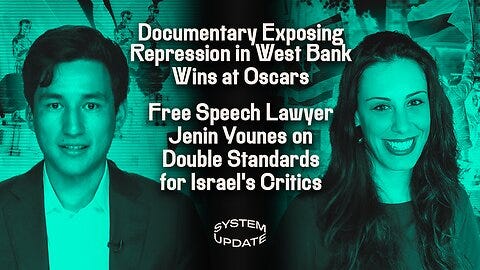Oscar-Winning Documentary Faces Institutional Censorship
How American audiences face obstacles from viewing the globally lauded film "No Other Land" -- a joint Israeli-Palestinian film about the West Bank.
This week, I am guest hosting Glenn Greenwald’s online show, System Update. Last Sunday, the film “No Other Land” won Best Documentary.
The film, however, does not have a U.S. distributor. No studio or streaming service would touch it. The New York Times reported that this phenomenon is now common for many “topical documentaries.” That isn’t entirely true. Rather, movies critical of Israel’s human rights record are frequently censored by the U.S. film industry, a dynamic that uniquely suppresses this issue area from reaching American audiences. In fact, a documentary I worked on recently faced similar soft suppression.
I also spoke to Jenin Younes, a civil liberties attorney who helped lead the challenge to the Biden administration on social media censorship. We discussed problems in the free speech movement and the failure to stand on principle for all victims of censorship, how some far left pro-Palestinian voices and pro-Israel advocates tend to both add to the problem of dehumanization and the path for peace.
Watch below:



